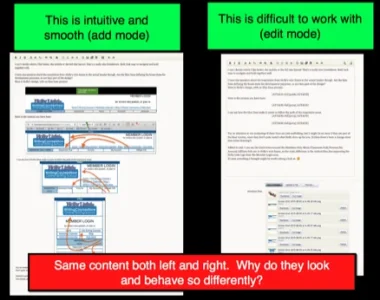I posted
my primary suggestion in the suggestions forum.
My primary suggestion is that edit should work like add.
I have a comment, as background to my suggestion.
BACKGROUND
I feel XF is special software. It is built upon brilliantly-assembled basics. Dozens of major innovations, are built upon those basics All the code and the applications for admin and the front end look like they all came from one really good developer or a shop of really good programmers who followed a master plan extremely well. XF front end templates are the only ones I have ever seen that work well. To the extent I can recognize old school vs. modern, everything in XF is modern. I would love to know who the key players were in developing XF, and I would love to interview them to get their account(s) of what they did. This system is not an accident.
So What Is The Reason for Leaving The Text Editor How It Is?
 click for full-size version (link)
click for full-size version (link)
I guess it is my imagination, but looking at the XF text editor, it looks like half is the brilliance typical of the rest of the system and the other half is an early prototype that needs to be rebuilt to match its other half. Maybe there is a major stockholder who'd rather keep the dough in his pocket than put it into a text editor that serves his or her needs already, needs that are untouched by the weird text editor.
This Text Editor Is So Good, Picky Professional Book Writers Say It's the Only Good Web-Based Text Editor They Ever Saw.
The team I am closest to is a team of professional fiction writers, who are as demanding and knowledgeable as anyone you can find on the subject of using text editors. Their comments are like this:
[quote by "Typical Response"]Before using XF, I never saw a browser-based text editor I did not hate.[/quote]
They feel the XF text editor is in a class of excellent by itself, because it does not foul up, it supports the level of formatting they are looking for, which is modest but not plain text either. They love the way it saves unposted text, he the way it accepts images pasted from the clipboard, and the responsive display of posted material that comes back. They want a stand alone text editor that works the same way. Integrated into a suite of tools I am making for them. They want a text editor that functions like XF ADD. Considering that it is professional writers saying saying this, I think this is serious information.
But, when it comes to editing previously posted items, xf text editor is as bad as ADD is good, especially the poor handling of images in edit mode. If I had any slack in my schedule, I'd have been making an editor that does the whole job pretty much the way ADD works and I would be then be seeing how far I could go persuading people this it is the best web-based text editor available bar none. It is a grandiose idea, but that is how it lines up from where I am involved, till it is proven otherwise. The groups of writers I am talking about is networked together in a way that a pretty penny is on the table waiting for the stand-alone text editor.
So I have kept wondering is why XF doesn't finish the editor? I thought maybe you are working on it but not disclosing that. I have been baffled.
The Other Odd Gap - Where Is the Technical Documentation?
If someone tells me I should be looking for the Xen Foro CODEX, I will probably not recover. What kind of idiots (WordPress) put their guide in a document named in a way no one could ever guess to search for, then act like you are the idiot for not knowing? Maybe they should go all the way and entitle their documentation: "You'll Never Find Any Information About WordPress In this Document," or publish it on stone tablets shipped through snail mail. If it were anything other than WordPress, I would give them a point of credit for at least having documentation, but that is not going to happen, because what the WordPress documentation says is so foul, it never will get credit of any kind from me.
So, where is the XF technical documentation? The
XF Manual covers using XF, including admin, but I want to know about <xf tags in templates, the XF class system, orientation to the the XF file system, and what to do about blobs in the database serving purposes I am accustomed to seeing handled by normal text fields. When I ask about something narrow in scope, I get referred THE pdf that explains it, usually somewhere within a thread I guess I was supposed to have read, but clearly not in a central repository.
So my question is: Has Britain trained a generation of programmers to follow principles they don't need documented specially for XF, because you all already know it anyway?
